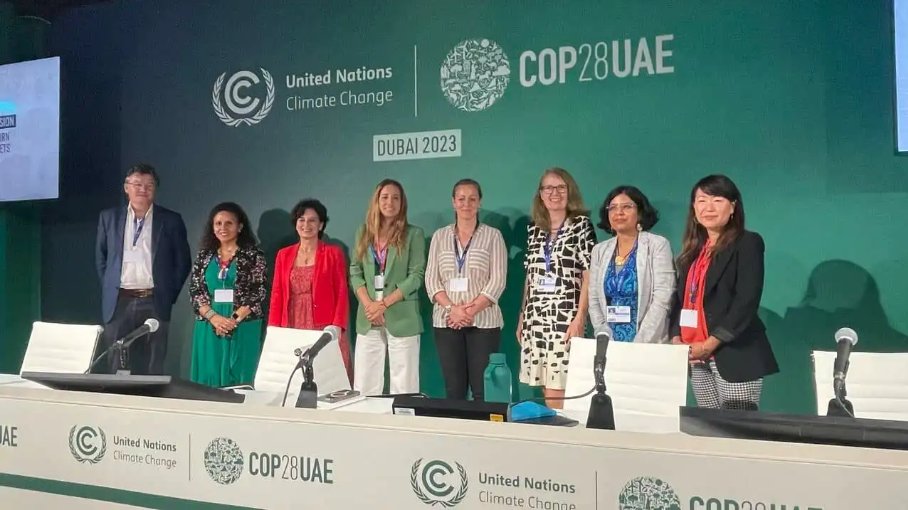Is circularity as a game changer for climate action – this question was discussed at a panel on 3rd December during COP 28, hosted by the UN Partnership for Green Economy.
The panel members highlighted country experiences in accelerating the circular economy transition. “We need more alliances and help and collaboration to really make all the policies that we are designing implemented at least in the small scale so that you can scale up with different projects I think it’s key and it’s very important […] I’ve been working with the ministry of labour and we turn around the idea of that the transition would really be very hard economically to really turn into a real opportunity by creating jobs and having a better um more growth and development”, indicated Cecilia Nicolini, State Secretary of Climate Change, Argentina.
Leena Nandan, Secretary, Ministry of Environment, Forest and Climate Change, India, shared the recent initiatives led by the Indian government, namely the Lifestyle for Environment and the eco-mark label. “The lifestyle for environment and it’s all about responsible consumption the basic concept is mindful utilization of resources […] so that ecomark will not only talk about the value of any product or service it will also embed in it in itself how much of environment sustainability has been built into that product or service (…)”, she said.
For Carla Montesi, Director for Green Deal and Digital Agenda at the EU Directorate-General for International Partnerships, the circular economy is “about knowledge sharing, it’s about capacity building, it’s about advocacy, it’s about explaining the importance of working in a circular economy what I would like to add that of course this is an important objective for Europe, and we are working with our partner countries in order to support our partner in moving in in the same ambition”.

Peru has started a public consultation on the road map of circular economy according to Milagros Diaz. She also highlighted the importance of evidence-based decisions in policymaking. “We cannot take decisions without a solid scientific background (…)”. Peru illustrates this through its collaboration with different research institutes (National University and the University of Costa Rica) throughout the development stages of its circular economy roadmap.
Angus Mackay, Director, Division for Planet Manager, Green Development and Climate Change Programme, UNITAR, and PAGE management board member concluded the event on behalf of Seth Nikhil, Assistant Secretary-General, Executive Director of UNITAR. “Circularity is not just a game changer for climate change but also for the SDGs more generally.”, he said.
The panelists included representatives of different governments from around the world (Argentina, European Union, India, and Peru) who are working with the concept of circular economy. Those were Cecilia Nicolini, State Secretary of Climate Change, Sustainable Development and Innovation, Ministry of Environment and Sustainable Development, Argentina; Leena Nandan, Secretary, Ministry of Environment, Forest and Climate Change, Government of India; Carla Montesi, Director for Green Deal and Digital Agenda, Directorate-General for International Partnership, European Union; Milagros Sandoval Diaz, General Director of Climate Change and Desertification at the Ministry of Environment, Peru. Miranda Schnitger, Climate Lead, Ellen MacArthur Foundation acted as the moderator.
(Text originally published by PAGE)
